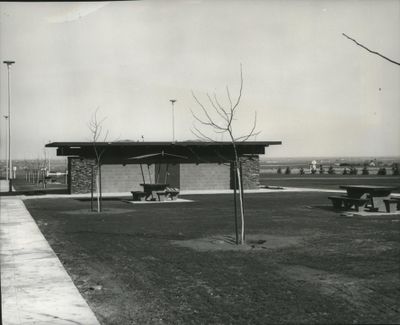This column reflects the opinion of the writer. Learn about the differences between a news story and an opinion column.
Paul Turner: When you gotta go, you gotta go

Growing up in the West is different.
At least it used to be.
And one of the reasons comes to mind as we approach summer vacation season and recall family road trips.
You see, things are so spread out in this part of the country and the driving distances so astonishingly long that there simply aren’t formal restroom options every couple of miles. So sometimes traveling families had to improvise.
Yes, that means exactly what you think it means. Finding “facilities” could become a decidedly free-range activity.
One of the things that makes the great outdoors great is the likelihood nobody will see you if you scramble out of the car and, uh, go see what’s up over behind that tree.
Now if the very idea of a carload of kids taking bathroom breaks on a freelance basis offends your delicate sensibilities, well, sorry. But life in the West isn’t for sissies.
It might have been fine for a parent back East to say, “Can’t you hold it?” But when the next official rest area is 60 miles down the road, you sometimes have to make do.
The rock band Canned Heat had a song about this back in the 1960s. Maybe you remember. I think they played it at Woodstock. It was called “Going Up The Country.”
I’m goin’ up the country, baby don’t you want to go?
I’m goin’ up the country, baby don’t you want to go?
I’m goin’ to some place, I’ve never been before.
OK, maybe that’s not what the song is about. But I digress.
If you talk to enough people who grew up in the West, you learn that this is partly a generational thing.
Back before completion of the interstate highway system, around the time of the dawn of man, long-distance road trips in the West could be a monumental test of bladders. The same can be said for modern families in SUVs traveling with kids sipping on drinks the size of oil drums.
In any event, when outposts of civilization become few and far between, something’s got to give.
Some families adopted liquid waste storage approaches pioneered by long-haul truckers. Others turned pre-emptive dehydration into an art form.
At least that’s what one hears when talking with those who grew up out here. Listening to lifetime Westerners, those of us who spent our childhoods in the Midwest or the Northeast quickly realize that the West is the big leagues when it comes to creative answers to the call of nature.
Now nobody is saying people out here have any less regard for sanctioned public hygiene than Americans elsewhere. It’s just that once you get away from the cities, the West has a lot of wide open spaces. Say no more.
Look, there’s nothing to romanticize about going to the bathroom where there are no bathrooms. It’s far from ideal. Not to mention the legalities.
But if you grew up in the West and recall long-distance road trips and lonely stretches of two-lane blacktop, there’s a chance you understand.
When you gotta go, you gotta go.
Even when there’s no place to go.
Little green men
Maybe it’s not new. Perhaps I’m just now noticing it.
But it seems like those lime-colored figures beseeching drivers to slow down are everywhere in Spokane right now.
You know the ones. They are about a yard tall and made of plastic. Usually they are adorned with a simple message: “SLOW!”
Sometimes these figures hold a small pennant. A few of them also feature the outline of a little dog.
You can’t really blame frustrated parents or grandparents for placing these figures at curbside. People drive too fast. Some drive way too fast. The police can’t be everywhere.
Sure, maybe these attempts to get motorists to slow down are about as effective as those old “Baby on Board” window stickers.
What was it Marge Simpson said before affixing one of those to the back of her vehicle? “Now people will stop intentionally ramming our car.”
But maybe the lime guys help a little. Oh, I suspect 99 out of 100 problem speeders will remain oblivious. Appealing to scofflaws’ better nature doesn’t usually work.
Still, if one Spokane driver slows down one time this summer because of these roadside figures, maybe that’s enough.
I mean, it could be for the little kid about to dart out into the street.
Just wondering
The presence of which group poses the greater challenge for Spokane as we look to the future?
People who moved here from a larger city in part to escape the reality of urban life.
Or people who never lived in a city before moving here.
Columnist Paul Turner can be reached at srpaulturner@gmail.com.
